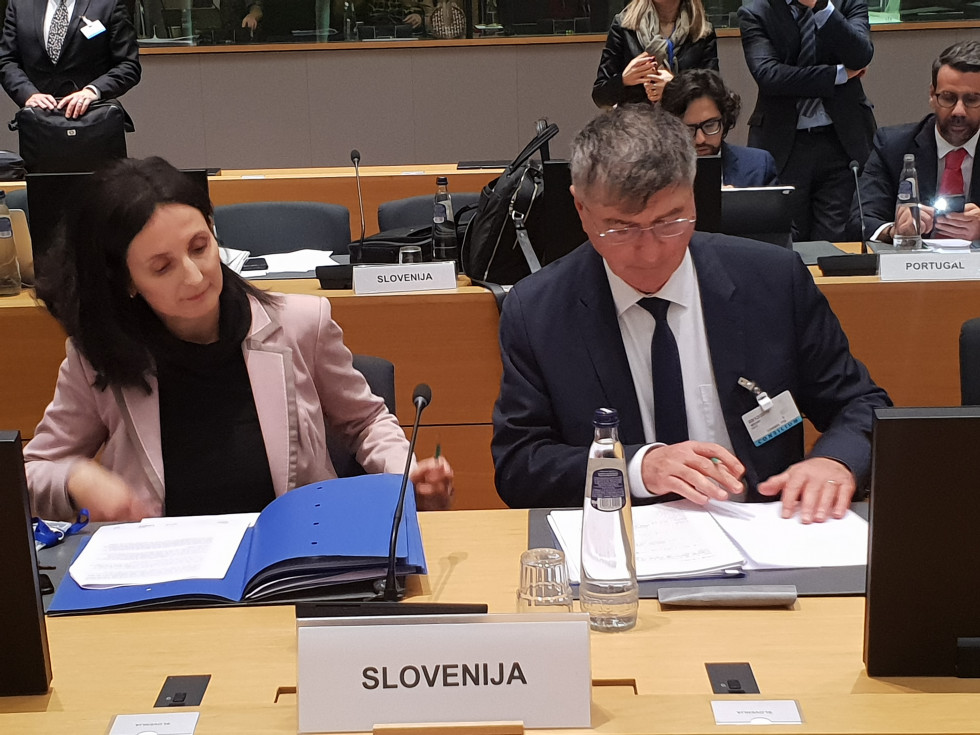Public Administration Minister Rudi Medved at the EU Telecommunications Council: European sovereignty over data should be based on ethical principles

The Minister of Public Administration, Rudi Medved, attended the meeting of the Transport, Telecommunications and Energy Council of the EU (TTE Council) | Author MJU
At the meeting he discussed ethical aspects that are essential for the success of the data economy. The main topic of the meeting was data accessibility and ethical use in the EU.
At the Council meeting, the ministers discussed additional measures and instruments necessary to promote the European data economy and data exchange in the private sector. Special attention was given to the necessity of building trust in the data economy, particularly with regard to the development of artificial intelligence and autonomous systems.
The ministers and other high officials also discussed the proposal for a regulation on e-privacy. Despite the efforts of the Finnish presidency, EU Member States have not been able to adopt a general approach to the proposal in almost three years. They agreed that the text is largely ambiguous but that the regulation of these sensitive areas should continue nevertheless. However, sensitive data should be protected in a way that does not create unnecessary obstacles to technological development.
Today, the EU Telecommunications Council was chaired by Croatia's presidency for the first time. The newly appointed commissioner responsible for telecommunications, Thierry Breton from France, presented himself at the meeting. He paid special attention to the issue of data management and reuse. He advocated the establishment of a European common data area, as he believes that views on data management are still largely divided in Europe. Mr Breton presented his idea concerning the range of high-quality data from all Member States to be made available to the interested public by 2021. According to Mr Breton artificial intelligence and cyber security are the key factors in data reuse.
In his address Mr Medved advocated the further development of the single digital market. He said that Slovenia's experience with open data is very positive. The public sector data are open data, which means that they may be accessed and used by any interested person. The data created in scientific research are also publicly available in Slovenia. Mr Medved pointed out that data created in business operations are still closed in many cases. We would like to use this data for new products that will benefit people. He particularly highlighted that trust built through the transparent use of data is essential for the success of the data economy and added that data use must be based on ethical principles and all necessary measures must be adopted to prevent any misuse of data. He concluded his address with his thoughts on European sovereignty over data, which is one of the key challenges Europe should address in the coming years. According to Mr Medved, European sovereignty must be founded on ethical principles, which will be our competitive advantage.
Mr Medved also participated in the discussion on the adoption of the new directive on e-privacy. He said that the old directive concerning e-privacy no longer provides the desired privacy standards and added that we have to ensure high standards of privacy for each individual person's communications. At the end of the meeting, the ministers adopted conclusions giving relevant significance to 5G technology for the European economy and development opportunities, also highlighting security challenges.
On the margins of the Telecommunications Council, Mr Medved signed the declaration on a quantum communication infrastructure. The aim of the declaration is to establish cooperation to study the options for introducing safe quantum communication in space and on Earth. Upon signing the declaration Mr Medved emphasised that "Europe must remain a world superpower with regard to investments in quantum technology. However, we want the new technology to be safe and serve humankind. The declaration is a step forward in reaching these goals. Countries need to collaborate to study the options for introducing safe quantum communication in space and on Earth."

